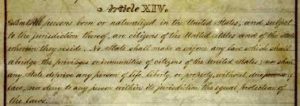 In one of his most controversial moves, President Donald Trump has said he wants to abolish birthright citizenship.
In one of his most controversial moves, President Donald Trump has said he wants to abolish birthright citizenship.
“We’re the only country in the world where a person comes in and has a baby, and the baby is essentially a citizen of the United States … with all of those benefits,” Trump continued. “It’s ridiculous. It’s ridiculous. And it has to end.”
President Trump plans to sign an executive order that would remove the right to citizenship for babies of non-citizens and unauthorized immigrants born on U.S. soil, he said yesterday in an exclusive interview with Axios.
I won’t debate whether he should do this. I would rather focus on the larger question, “Can he do this?”
The issue involves the 14th Amendment to the Constitution and its interpretation. Section I of the Amendment states, “All persons born or naturalized in the United States, and subject to the jurisdiction thereof, are citizens of the United States and of the state wherein they reside. No state shall make or enforce any law which shall abridge the privileges or immunities of citizens of the United States; nor shall any state deprive any person of life, liberty, or property, without due process of law; nor deny to any person within its jurisdiction the equal protection of the laws.”
The 14th Amendment to the U.S. Constitution, ratified in 1868, granted citizenship to all persons born or naturalized in the United States—including former slaves—and guaranteed all citizens “equal protection of the laws.” One of three amendments passed during the Reconstruction era to abolish slavery and establish civil and legal rights for black Americans, it would become the basis for many landmark Supreme Court decisions over the years.
If President Trump uses an executive order to abolish birthright citizenship it is bound to be challenged as unconstitutional. According to Axios, “Few immigration and constitutional scholars believe it is within the president’s power to change birthright citizenship, former U.S. Citizenship and Immigration Services chief counsel Lynden Melmed tells Axios.
- But some conservatives have argued that the 14th Amendment was only intended to provide citizenship to children born in the U.S. to lawful permanent residents — not to unauthorized immigrants or those on temporary visas.
- John Eastman, a constitutional scholar and director of Chapman University’s Center for Constitutional Jurisprudence, told “Axios on HBO” that the Constitution has been misapplied over the past 40 or so years. He says the line “subject to the jurisdiction thereof” refers to people with full, political allegiance to the U.S. — such as green card holders and citizens.
Michael Anton, a former national security official in the Trump administration, recently took up this argument in the Washington Post.
- Anton said that Trump could, via executive order, “specify to federal agencies that the children of noncitizens are not citizens” simply because they were born on U.S. soil. (It’s not yet clear whether Trump will take this maximalist argument, though his previous rhetoric suggests there’s a good chance.)
- But others — such as Judge James C. Ho, who was appointed by Trump to Fifth Circuit Court of Appeals, in New Orleans — say the line in the amendment refers to the legal obligation to follow U.S. laws, which applies to all foreign visitors (except diplomats) and immigrants. He has written that changing how the 14th Amendment is applied would be “unconstitutional.”
It’s a hotly contested issue and the courts realize that any decision will have a far reaching impact not only for immigration but presidential powers and the nature of the Constitution itself.
